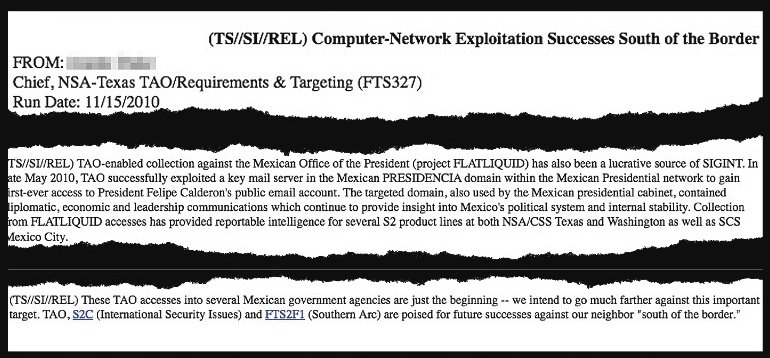A Snowden leak,
discussed in detail in Der Spiegel,
shows how the NSA broke into the email servers of the Mexican president
Felipe Calderon's public account, and used that access to wiretap the
president, cabinet members, and senior diplomats. The NSA described the
program, called "Flatliquid" as "lucrative." A second program,
"Whitetamale," also spied on senior Mexican politicians (including
presidential candidate Peña Nieto), targeting efforts to change the
country's disastrous War on Drugs.
Rousseff believes Washington's reasons for employing such unfriendly
methods are partly economic, an accusation that the NSA and its
director, General Keith Alexander, have denied. Yet according to the
leaked NSA documents, the US also monitored email and telephone
communications at Petrobras, the oil corporation in which the Brazilian
government holds a majority stake. Brazil possesses enormous offshore
oil reserves.
Just how intensively the US spies on its neighbors can be seen in
another, previously unknown operation in Mexico, dubbed "Whitetamale" by
the NSA. In August 2009, according to internal documents, the agency
gained access to the emails of various high-ranking officials in
Mexico's Public Security Secretariat that combats the drug trade and
human trafficking. This hacking operation allowed the NSA not only to
obtain information on several drug cartels, but also to gain access to
"diplomatic talking-points." In the space of a single year, according to
the internal documents, this operation produced 260 classified reports
that allowed US politicians to conduct successful talks on political
issues and to plan international investments.
The tone of the document that lists the NSA's "tremendous success" in
monitoring Mexican targets shows how aggressively the US intelligence
agency monitors its southern neighbor. "These TAO accesses into several
Mexican government agencies are just the beginning -- we intend to go
much further against this important target," the document reads. It goes
on to state that the divisions responsible for this surveillance are
"poised for future successes."


No comments:
Post a Comment